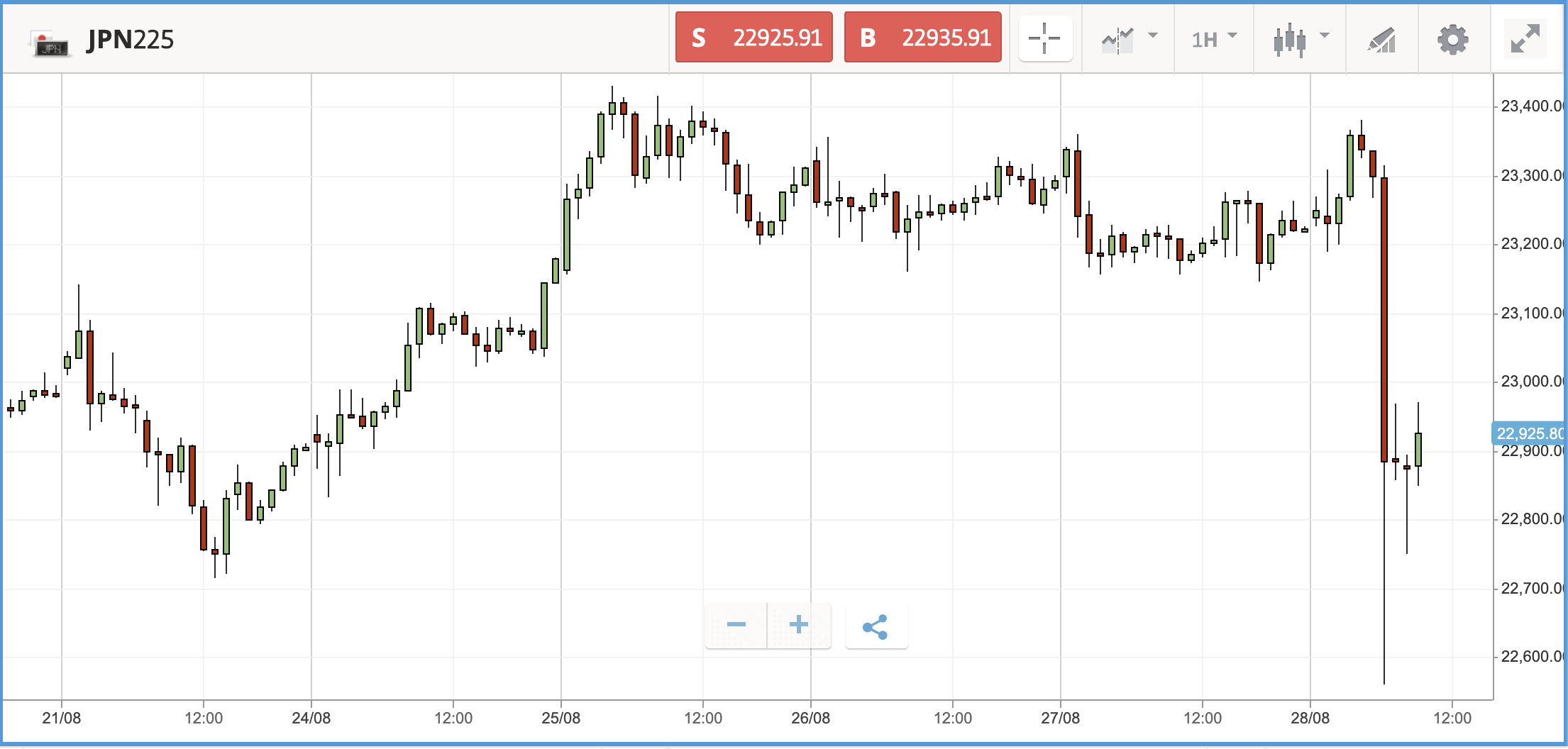Japanese equities dropped overnight after broadcasters in the country said Shinzo Abe, the country’s longest-ever serving Prime Minister, was to step down over health concerns.
Abe, who has enjoyed two spells as Prime Minister, started his current term in 2012 and has overseen the economy through numerous crises, including the latest one sparked by coronavirus.
NHK, the national broadcaster, first reported the news overnight, with Abe due to hold a press conference later today. The news spooked investors, with the Nikkei down 1.5%, while Japan’s yen, often a haven in times of geopolitical uncertainty, strengthened 0.2% to 106.26 yen per dollar.

Elsewhere, yesterday the US Federal Reserve chair Jerome Powell announced a new policy that would allow inflation to run over its 2% target for a sustained period and argued that “a robust job market can be sustained without causing an outbreak in inflation.” The policy means that the Fed is more likely to allow inflation to persist above 2% without raising interest rates. In addition, the Fed supports a strong jobs market, which the central bank has historically believed leads to dangerous inflation. Powell said that the change “reflects our appreciation for the benefits of a strong labour market, particularly of many in low and moderate income communities.”
In other headlines, supermarket giant Walmart entered the race to acquire social media sensation TikTok’s US operations, joining Microsoft’s bid. Per The WSJ, the joint Microsoft-Walmart bid is the front runner, in what is anticipated to be a $30bn deal. A second group that includes Oracle is also reportedly in the running.
Financial stocks gain in rollercoaster day for US stocks
It was a rollercoaster day for US stocks, with the S&P seesawing from a gain to a loss and back to a gain again. The index ended the day 0.2% higher, while the Dow Jones Industrial Average added 0.6%. Walmart led the day after its ties to the TikTok deal, while financial names JPMorgan Chase, Travelers and American Express all added more than 3% too.
In the S&P, the financial sector was the biggest winner, adding 1.7%, with consumer finance stocks delivering the best day at a 3.9% gain overall. The Nasdaq Composite posted a marginal loss for the day, although its gain over the past week still stands at 3.2%. Among the 100 largest names in the index, Marriott and Tesla both delivered 4% plus daily gains, but it was held back by Dollar Tree, Netflix and eBay, which fell 7.2%, 3.9% and 3.9% respectively. Dollar Tree beat earnings expectations on Thursday, but its share price fell as investor expectations were set sky high.
S&P 500: +0.2% Thursday, +7.9% YTD
Dow Jones Industrial Average: +0.6% Thursday, -0.2% YTD
Nasdaq Composite: -0.3% Thursday, +29.6% YTD
WPP jumps after reinstating dividend
The FTSE 100 fell 0.8% on Thursday, with gains from companies including advertising firm WPP and British Airways parent IAG failing to outweigh losses from firms such as housebuilder Persimmon, chemicals firm Johnson Matthey and miner Anglo American. WPP stock jumped 6.6% as despite delivering a multi-billion pound loss, the firm has brought back its dividend and provided detailed guidance on how it expects the rest of the year to pan out from a revenue standpoint. The FTSE 250 was close to flat on Thursday, although there was one stand-out winner of the day. OneSavings Bank stock surged by more than 15% after it reported that loan application numbers have jumped since the UK housing market was restarted, although the level remains significantly below pre-pandemic levels.
FTSE 100: -0.8% Thursday, -20.5% YTD
FTSE 250: -0.1% Thursday, -18.8% YTD
What to watch
Big Lots: Big Lots is an Ohio-based retailer with 1,400 stores nationwide in the US, that sells everything from groceries to cleaning supplies and furniture. The discount chain, which reports its Q2 earnings on Friday, has nearly doubled its share price year-to-date, and has gained 153% over the past 12 months. Big Lots has been a beneficiary of consumers rushing to buy essential items due to the pandemic, and delivered a major earnings beat in Q1. Currently, three Wall Street analysts rate the stock as a buy, five as a hold and one as an underweight. Expectations for the company’s Q2 earnings per share number have more than tripled over the past three months.
US consumer spending: After the lowest consumer confidence figures in six years were reported earlier this week, US personal income and personal spending data for July will be delivered on Friday. In June, personal spending increased 5.6% month-over-month, but expectations are for that growth rate to have slowed markedly in July.
Crypto corner: Industry welcomes US rule change to investor status
The cryptoasset community has broadly welcomed a rule change by the US regulator, which should help more people access bitcoin and other digital assets.
This week the US Securities and Exchange Commission amended its definition of an “accredited investor” to be based on “professional certifications, designations or credentials, or other credentials issued by an accredited educational institution”, according to a report on CoinTelegraph, Under the old definition, accredited investor status was linked to one’s wealth, with such individuals needing to have either $1 million in net worth or a stable income of at least $200,000 per year.
Prominent figures, including crypto billionaire Tyler Winklevoss, welcomed the move. He tweeted: “Kudos to the SEC for acknowledging that a penniless GenZ’er can be just as sophisticated an investor as a Wall Street Boomer. Wealth does not equal investment acumen.”
Changing the rule will ultimately expand the cryptoasset universe to many more people.
All data, figures & charts are valid as of 28/08/2020. All trading carries risk. Only risk capital you can afford to lose.

